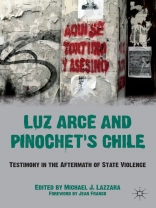Since the demise of the Pinochet dictatorship in 1990, collaboration and complicity – both in the torture chamber and civil society – have been taboo topics not only for the Chilean left but also for society at large. By revisiting the experience of Luz Arce Sandoval – a leftist militant turned collaborator with Pinochet’s secret police – Luz Arce and Pinochet’s Chile raises urgent political and ethical questions about how nations carry out unspeakable violence in the name of ‘progress’ and ‘democracy.’ Juxtaposing interviews, legal documents, and academic analysis, this book probes the personal and collective dimensions of torture, collaborationism, truth, justice, reconciliation, and memory, issues that resonate in Latin America and beyond.
Table of Content
Foreword; J.Franco Introduction: After the Inferno; MJ.Lazzara PART I: NAMES, DATES, PLACES: SUMMARY OF LUZ ARCE’S DECLARATION BEFORE THE NATIONAL TRUTH AND RECONCILIATION COMMISSION (SANTIAGO DE CHILE, OCTOBER 9, 1990) PART II: INTERVIEW WITH LUZ ARCE (MEXICO, CHILE, 2002-2007) The Militant, the Sympathizer Collaboration, Critiques, Remorse Trauma and Writing Masculinity and Femininity Luz, Marcia, Carola (Ana María Vergara, Marta Vergara, Gloria Vilches) Shame and Reconciliation The Present Time: New Critiques and Pending Questions * PART III: FORUM: COLLABORATION, DICTATORSHIP, DEMOCRACY Pedro Alejandro Matta Gloria Elgueta Victoria Langland Patricia Espinosa Jorge Arrate Gabriela Zúñiga Figueroa Michael J. Lazzara Tamara Spira
About the author
MICHAEL LAZZARA Assistant Professor of Latin American Literature and Culture at the University of California, Davis, USA.












